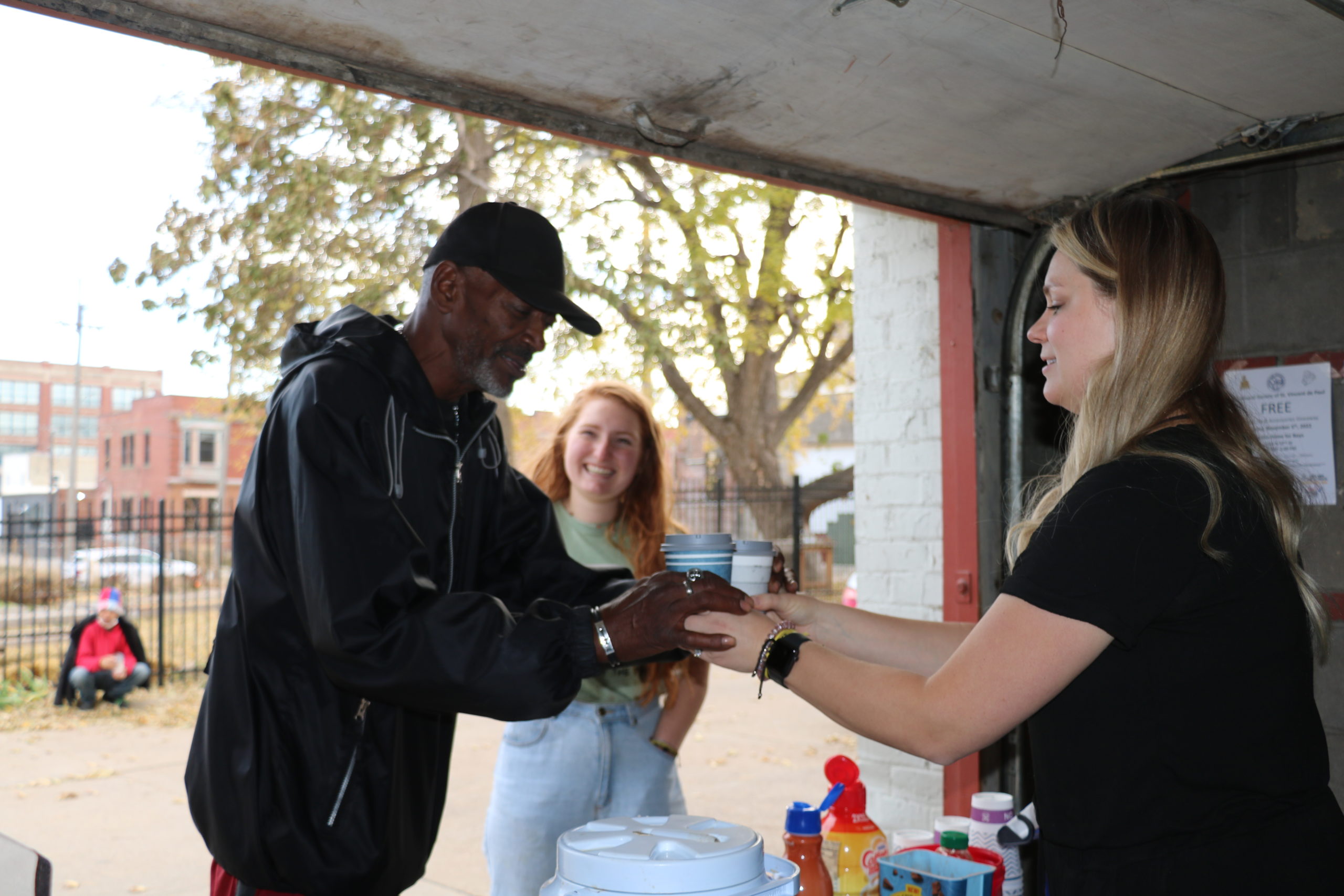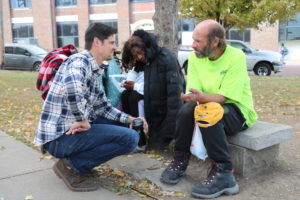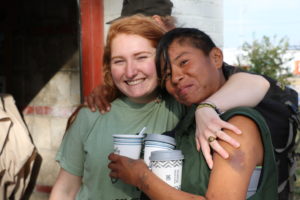
Hope of the Poor missionary Amanda Forman hands a cup of coffee to Depris, while missionary Bella Worthing waits to greet him during the group’s “coffee garage” ministry. KIMBERLY JANSEN
News
Ministry to the homeless serves up love and kindness along with the coffee
November 15, 2022
Regular patrons of any neighborhood coffee shop are accustomed to a friendly barista greeting them by name and preparing their favorite drink.
At Holy Family Community Center near downtown Omaha, the Hope of the Poor “coffee garage” offers this same kindness and sense of belonging to homeless men and women but without the expense.
“The beautiful thing is we’re not here to serve coffee; we’re here to learn people’s names and to learn their stories,” said Danny Leger, cofounder of Hope of the Poor, a nonprofit organization dedicated to facilitating an encounter with Christ for individuals and groups while directly meeting the needs of the poor.
Leger, a member of St. Elizabeth Ann Seton Parish in Omaha, called Hope of the Poor’s mission a “ministry of presence.”
“Because we’re here consistently, we know their names, their struggles, and we know how they like their coffee,” Leger said. “It gives (the homeless) dignity to say, ‘I’ll have my regular,’ and we know what that means.”
Leger started Hope of the Poor (HOTP) in 2016, with Craig Johring, a native of O’Neill. HOTP’s initial method of evangelization relied heavily on mission trips to Mexico City; however, when the COVID-19 pandemic paused foreign missions in 2020, Leger investigated ways to serve locally instead.
With the blessing of the Society of St. Vincent de Paul, which houses its district headquarters at Holy Family, Leger began purchasing cups of coffee from McDonald’s and passing them out to the homeless. Nearly two years later, HOTP missionaries brew and distribute over 100 cups of coffee on site every Monday, Wednesday and Friday.
Deacon Marty Smith, executive director of the Society of St. Vincent de Paul in Omaha, called the coffee ministry a “wonderful collaboration and partnership” with the outreach already in place at Holy Family. For decades volunteers have coordinated daily sack lunches for area residents, he said, in addition to offering a closet of donated clothing.
Deacon Smith called it a “real treat” for “our neighbors” to have an opportunity to choose cream and sugar for their coffee or honey for their oatmeal.
“Listening to what they’re asking for and giving them options is a rare experience for a lot of these folks,” he said.
Deacon Smith recently noticed a man walk away with a “huge smile” after an encounter with Hope of the Poor missionaries, despite the extreme suffering in his life.
“The joy with which he was being helped was infectious,” Deacon Smith said.
Leger recalled a homeless man named Joe who said he comes to the coffee garage because it feels safe.
“(Our neighbors) feel that there is this sense of peace … and that we are trustworthy,” Leger said. “We don’t have any agenda or any expectations. We’re just here to value them.”
CONSISTENCY AND CARE
Ed Starks, a resident at Siena Francis House, a homeless shelter down the street from Holy Family, said he appreciates the food and drink choices in addition to the HOTP missionaries’ consistency and care for the community.
“They’re out here rain or shine,” he said. “They’ll give you the shirt off their backs.”
Leger explained that when neighbors gather on the Holy Family lawn to enjoy their coffee the missionaries have an opportunity to visit at a deeper level and to pray with those in need.

Hope of the Poor missionary Danny Leger, left, visits with “Mama Julia” and Brian on the lawn of the Holy Family Community Center in Omaha. KIMBERLY JANSEN
The missionaries both celebrate and mourn alongside their homeless friends, he said. For example, they recently performed a musical concert to entertain the community and have also provided a memorial service to honor a departed neighbor.
HOTP missionary Bella Worthing, a member of St. Cecilia Parish in Omaha, said one of the greatest challenges is accepting that the complicated problems at hand often do not have immediate solutions.
“I can’t do anything, but I can be with them and hold them in their pain,” she said.
Leger agreed.
“I can’t end poverty or homelessness, but I can embrace that and surrender that to Jesus,” he said. “When we encounter our own poverty, that’s where the real conversion happens.”

Hope of the Poor missionary Bella Worthing, left, gives a hug to “Pretty,” a regular at the downtown “coffee garage” that serves the homeless three mornings a week. KIMBERLY JANSEN
KNOWN AND LOVED
This dynamic points to the complimentary side of Hope of the Poor’s mission.
While helping the poor feel known and loved, Leger said HOTP missionaries also give individuals and groups an opportunity to encounter “Jesus in disguise” – both in the Eucharist as they gather in prayer and song in the Holy Family chapel and later serving coffee to the homeless.
In over a decade of music and youth ministry, Leger said he has witnessed the power of worship, retreats, discipleship groups and conferences; however, he called an encounter with Christ in the poor “the sharpest tool for evangelization I’ve ever seen.”
Over 100 Nebraska high school students have served coffee at Holy Family since 2021, but Worthing recalled the transformation of one group of students in particular.
“It’s early in the morning, and nobody wants to be here,” Worthing said to herself, as HOTP missionaries led the group in worship music before the Blessed Sacrament. “Jesus, how are you going to come through?”
Two hours later Worthing said her prayer was answered as she witnessed the teens smiling as they talked about their new friends on the street and the joy they found there.
“They were struggling to connect with Jesus in the Eucharist, but they were able to meet him in the poor,” she said, adding that students’ posture and attitude is markedly different when they return to prayer at the end of the mission.
JESUS IN DISGUISE
Leger emphasized the importance of helping mission participants see the connection between Jesus’ disguise in the Eucharist and his disguise in the poor.
“We fill up (on Jesus’ presence) with the Eucharist since that’s what we’re really trying to give,” he said.
Dana Ritzdorf, campus minister at Scotus Central Catholic High School in Columbus, coordinated the service of two groups of students at the coffee garage since July – a summer mission and a sophomore retreat. Ritzdorf said most students who served coffee during the summer chose to do so again, even amidst other retreat options.
“I noticed all these (high school) guys calling the homeless people by name,” she said. “They remembered them all, wanted to go say ‘hi’ and continue their conversations. I was impressed by that.”
Scotus freshman Lola Doerneman said she was nervous upon arrival at Holy Family, but as she met the homeless and heard their stories, it became “easier to see Jesus in them.”
“There is not only financial poverty, but also spiritual poverty,” she said. “They really need love and being known. They’re just normal people.”
Worthing said she often reflects on this truth.
“We’re all broken, but some of us just hide it better than others,” she said.
HOTP missionary Scott Watts agreed.
“I need this mission as much as anybody,” he said. “The poor can be unpleasant – they can smell bad, curse, all kinds of things, but that discomfort will oftentimes make us a little more receptive (to God).”
Watts, who joined the Catholic Church in 2010 at St. Elizabeth Ann Seton Parish in Omaha, invited everyone to “find their own Calcutta,” as Mother Teresa once said.
“Everybody may not be called to the charism where serving the poor is the primary thing they do all the time,” he said, “but as Christians, working with the poor is in the basics.”